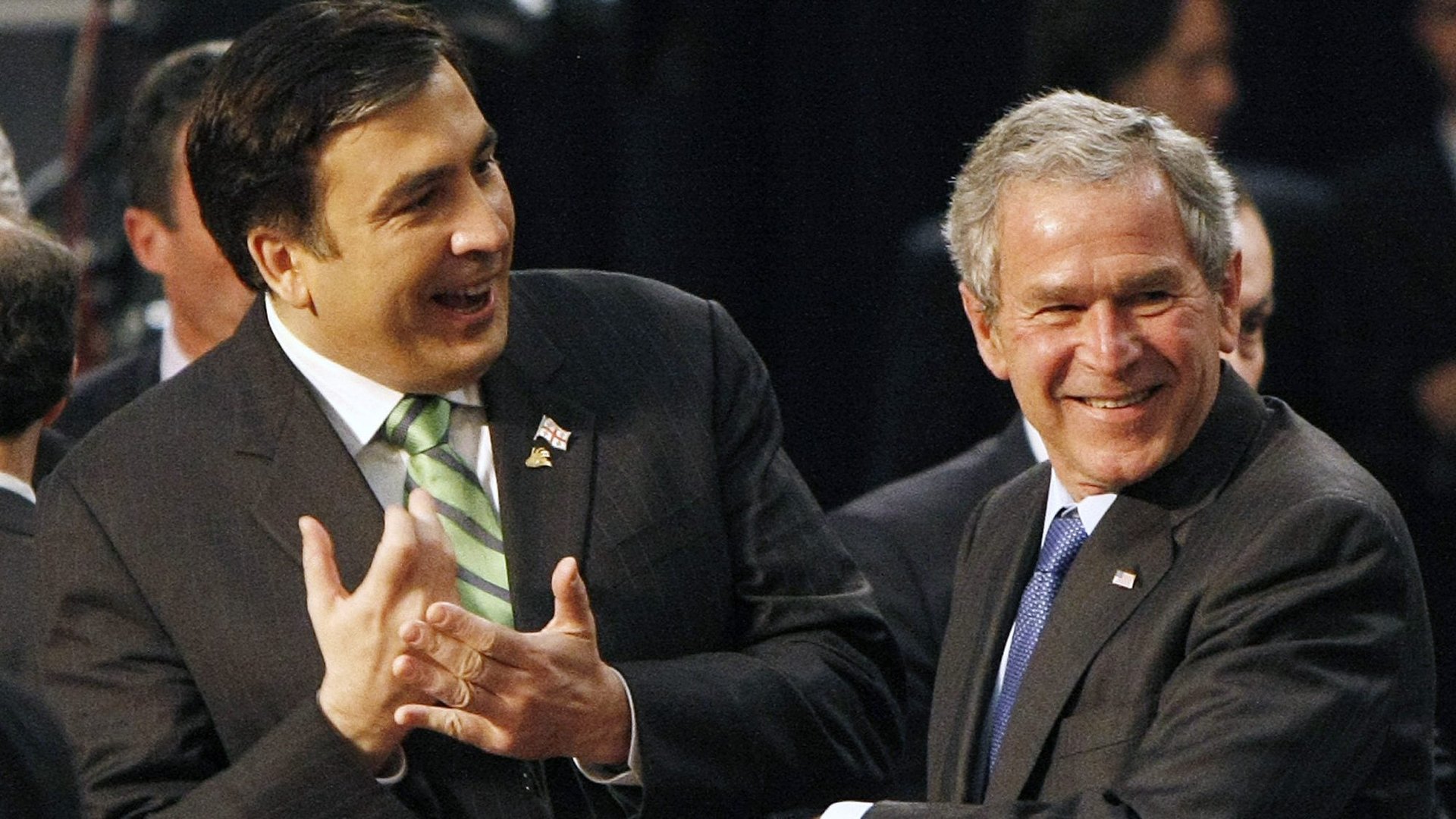The ex-president of Georgia may now be the world’s only stateless former head of state
Mikheil Saakashvili has never shied away from confrontation. The brilliant, charming, irascible, unreliable former president of Georgia came to power after mass protests in 2003. Roses had become the symbol of the opposition, and Saakashvili stood up in parliament, waved just such a flower in the face of the country’s leader of 30 years, former Soviet foreign minister Eduard Shevardnadze, and shouted “Resign!” Months later, the charismatic, US-educated lawyer was president.


Mikheil Saakashvili has never shied away from confrontation. The brilliant, charming, irascible, unreliable former president of Georgia came to power after mass protests in 2003. Roses had become the symbol of the opposition, and Saakashvili stood up in parliament, waved just such a flower in the face of the country’s leader of 30 years, former Soviet foreign minister Eduard Shevardnadze, and shouted “Resign!” Months later, the charismatic, US-educated lawyer was president.
Things don’t look so auspicious now. Saakashvili finds himself seemingly not only jobless but also stateless, having suffered a second political downfall (in Ukraine, this time; the first was at home) and now, the BBC reports, losing citizenship of his adoptive country as well as his original one. How did the once fresh-faced Columbia University graduate, who at one time embodied all the West’s hopes for the post-Soviet region, get here?
An ignominious end in Georgia
Saakashvili’s presidency began with some impressive anti-corruption reforms and a charm offensive that won over the likes of then-US president George W. Bush and senator John McCain. Things went downhill, though, when he was suckered into a disastrous short war with Russia in 2008, believing he would get American support. After a rapid defeat, he spent five more years in office, during which human-rights groups became increasingly critical of his rule.
He left office in 2013 and his anointed successor suffered a humiliating election loss (paywall) to the protégé of his bitter rival, billionaire prime minister Bidzina Ivanishvili. Soon afterwards prosecutors charged Saakashvili with abuse of power.
Brooklyn exile
And, thus, Saakashvili, who fervently denies the charges, wiled away the time in exile in a Brooklyn apartment. A 2014 New York Times profile (paywall) painted a picture of a doleful Misha, “considerably plumper than when he was in power,” eyeing a way to return to the limelight in Ukraine while he biked around Williamsburg. The chance came in 2015, when his ally in Ukraine, president Petro Poroshenko, offered him the job of governor of Odessa with a mandate to clean up corruption.
A new Ukrainian
To take the job, Saakashvili had to give up his Georgian passport and become a Ukrainian citizen. Reportedly known as the “energizer bunny” (paywall) by the US secret service, Saakashvili threw himself into the job with characteristic vigor and picked unedifying fights with prime minister Arseniy Yatsenyuk and interior minister Arsen Avakov. In one public meeting, he repeatedly shouted “thief” at Avakov, who eventually threw a glass of water in his face.
Saakashvili didn’t stop there though, extending the criticism to president Poroshenko. After a series of verbal sallies at his boss, the former Georgian president bowed out of the Odessa role in November, just 18 months after taking the job, with typical bombast: “What difference for Ukrainians does it make who will treat them like dirt: Poroshenko or [deposed former president] Yanukovych; what difference who will steal from them?” he asked.
He promised to challenge Poroshenko in elections and on the streets with his Movement of New Forces party. The Ukrainian government this week decided to strip him of his citizenship while he was on a visit to the US, claiming he hadn’t informed it of the criminal charges against him in Georgia when he got the passport. Saakashvili, in a video posted online (in Ukrainian), dismissed this explanation, claiming no country, Ukraine included, recognizes the legitimacy of those charges.
Losing his passport means he can’t run for office, but, Saakashvili said in the video, his woes are just like those of everyone else in the country he joined in 2015. ”I am a simple Ukrainian,” he said. “Today they are trying to do to me what prosecutors or bureaucrats do to ordinary Ukrainians: spitting on their rights.”
Other ordinary Ukrainians don’t seem too outraged. About 400 people reportedly came out to protest his loss of citizenship.